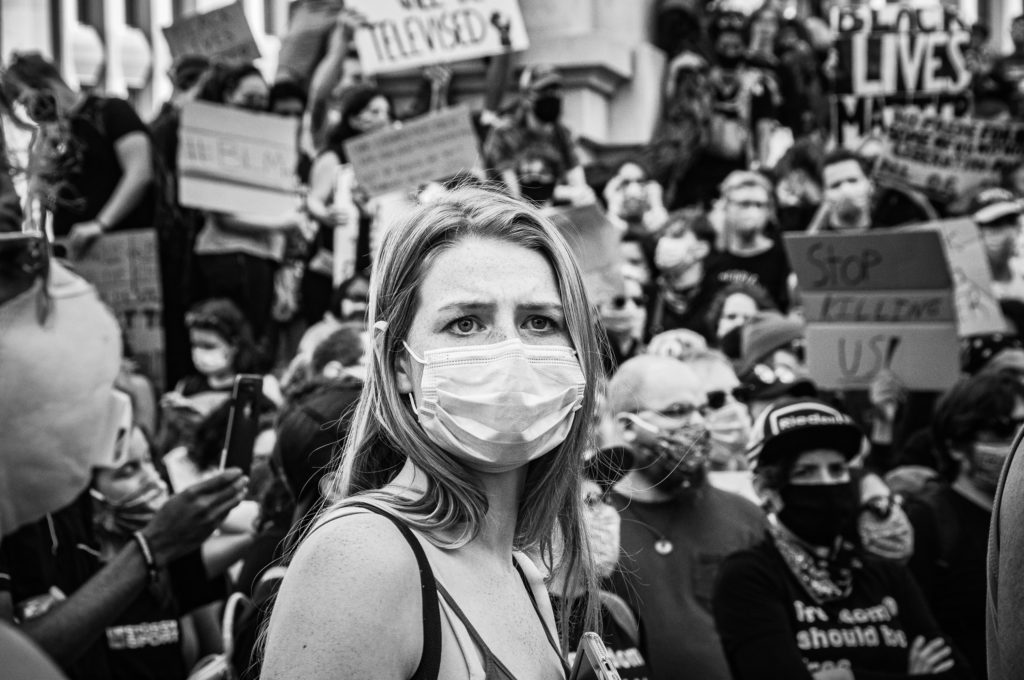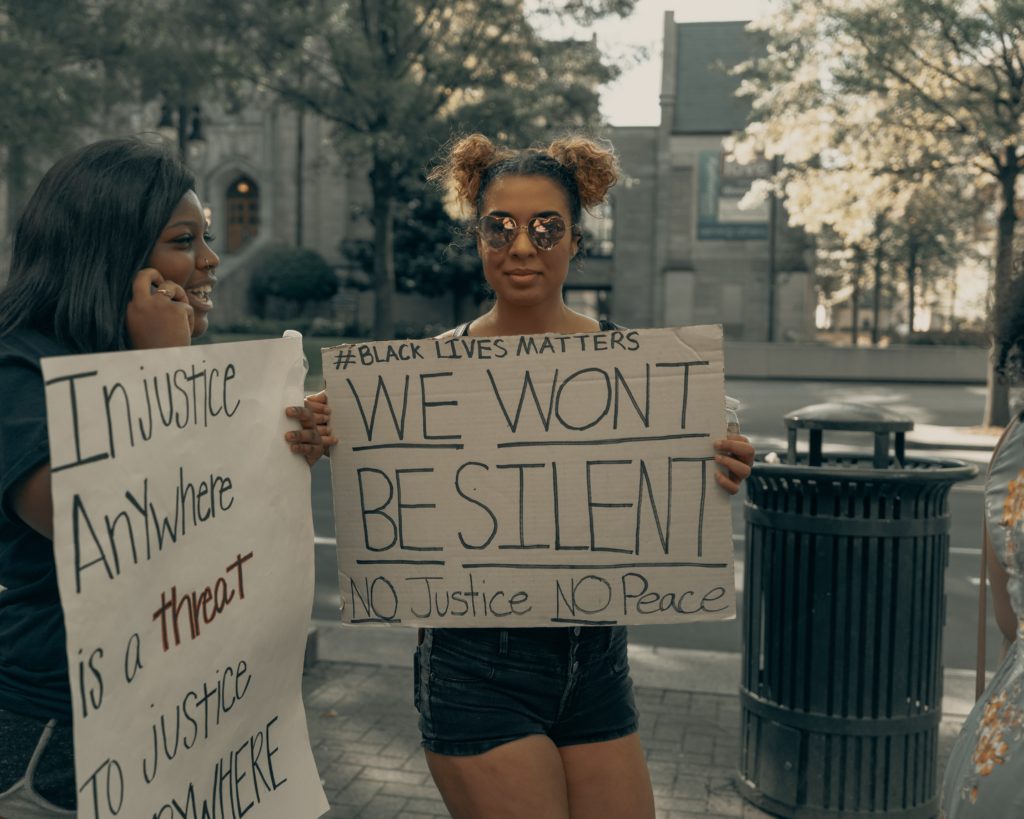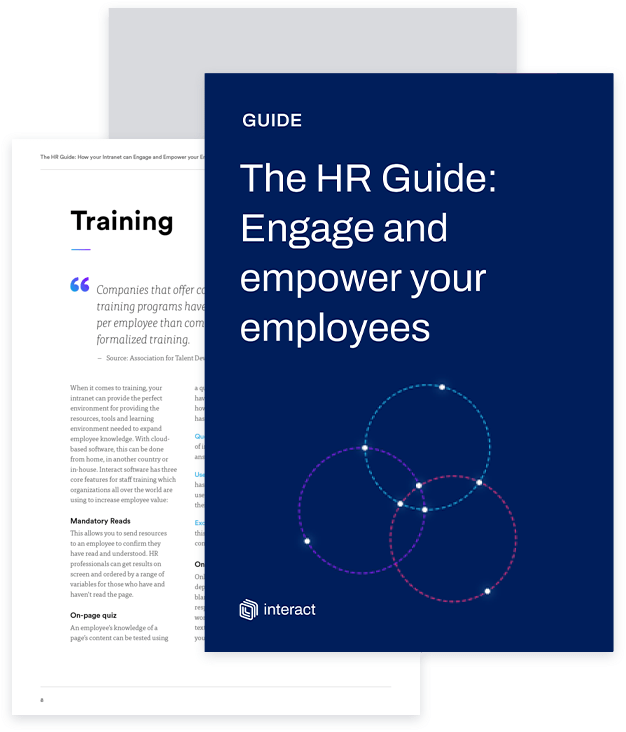Political speech in the workplace is an increasingly divisive topic. How we enable it – or disable it – is enormously complex. As HR teams tackle this fresh set of issues, how should businesses manage such an emotionally charged subject while maintaining a supportive environment for employees to learn and understand?
The last year has presented businesses with many challenges – particularly our role in managing political and social discourse in the workplace. As business leaders, do we create an environment that can support and encourage the need for employees to express their opinions and feel comfortable discussing political and social matters in the context of our day-to-day work lives? Or are these types of conversations a scourge on the workplace, creating division, hostile working environments, and isolation?
Organizations, particularly high-profile ones, are gaining press attention in the way they are managing the employee voice in the workplace. In the past twelve months, we’ve experienced a traumatic and politically charged pandemic, a polarizing US election, and global protests against racial inequality and police brutality. These are all important subjects that are affecting our co-workers, friends, family – even ourselves. But they create difficult conversations and many different perspectives. When we’re trying to maintain social harmony within our organizations, but external events are impacting our employees, how political should we let our workplaces be?
Do we welcome political discussion or shy away from divisiveness?

As more employees become moved to speak more openly about their views and the circumstances surrounding them, businesses will need to confront this question. A number of high-profile organizations have already declared their stance on political discussion in the workplace.
The guide for HR professionals
Managing this is a delicate matter for businesses. A veto on political speech could be seen as censorship, a failure to address real-time issues, a dehumanizing of the workplace. However, encouraging employees to side with the company’s political affiliations like Nike, Lush, and Heinz do could risk alienation, discrimination, and a derailing of the primary mission of the business.
Despite the obvious controversy it could cause, some brands have been very vocal with their policies, drawing a mixture of criticism and admiration from social media and news outlets.
The leave-it-at-the-door approach

In April 2021, Jason Friend, founder of Basecamp, sent a note to all employees informing them of a reworking of the company’s policy on political discussion in the workplace.
“Today’s social and political waters are especially choppy. Sensitivities are at 11, and every discussion remotely related to politics, advocacy, or society at large quickly spins away from pleasant. You shouldn’t have to wonder if staying out of it means you’re complicit or wading into it means you’re a target. These are difficult enough waters to navigate in life, but significantly more so at work.
When the CEO of Coinbase released a memo restricting political speech in the office, more than 60 employees, or roughly 5% of its workforce, accepted exit packages.
Forbes
“It’s become too much. It’s a major distraction. It saps our energy and redirects our dialog towards dark places. It’s not healthy, it hasn’t served us well. And we’re done with it on our company Basecamp account where the work happens. People can take the conversations with willing co-workers to Signal, Whatsapp, or even a personal Basecamp account, but it can’t happen where the work happens anymore. “
Basecamp has been criticized for an apparent lack of cultural awareness and an embargo on important conversations. But is it contributing to the silencing of those who already have to shout to be heard? Many others have supported the policy, with Coinbase chief executive Brian Armstrong (who set down similar company guidelines in 2020) tweeting, “another mission-focused company…Who will be next?”
The embrace-the-discussion approach

In the tech industry, where many businesses try to stand out among their competition with unique and progressive attitudes towards corporate social responsibility, Basecamp’s stance is unusual. When Fried says, “We’re not a social impact company. We’re in the business of making software,” he’s contradicting his Silicon Valley associates and their claims about the role of tech in society.
In sharp contrast to Basecamp, a large number of big brands have used their platform and status to talk openly about social, political, and cultural issues. Nike has famously been politically vocal for many years, creating an ad in the run-up to the last US election calling upon Americans to “change the world.” When Colin Kaepernick took the knee to protest against racial injustice, Nike made the quarterback the star of their next campaign.
Ice cream brand, Ben & Jerry’s, has not shied away from political discussion either, particularly its anti-Trump sentiment. During the 45th presidency, the company produced a new flavor, “Pecan Resist”, to support “groups creating a more just and equitable nation for us all, and who are fighting President Trump’s regressive agenda”. Employees at Ben & Jerry’s are encouraged to engage in philanthropy and social change, to support grassroots activism and communities.
Brand activism

This approach taken by Nike and Ben & Jerry’s is brand activism – something used by a growing number of companies to promote a higher purpose than their bottom lines. Brand activism is a product of the more established Corporate Social Responsibility (CSR) and Environmental and Social Governance (ESG) programs within organizations.
Of course, it’s the organization’s prerogative on how heavy it wants to go in this arena. Most companies have a CSR program which could be seen as light touch compared to some high-profile brands. But this isn’t to suggest these programs mean any less. In fact, businesses are realizing more and more how important it is to stand for something.
The guide for HR professionals
In 2015, Harvard Business Review produced their Best Performing CEOs in the World. Their rankings were based on 80% long-term financial results and 20% ESG. Given Amazon’s relatively weak ESG score, Jeff Bezos did not even make the top fifty. The top spot was given to Lars Rebien Sørensen, CEO of Novo Nordisk, the Danish pharmaceutical company. This is a company that has decided to focus on CSR to maximize the value of the company over a long period, as Sørensen says. “In the long term, social and environmental issues become financial issues.”
It has done this by offering insulin at a steep discount to consumers in developing countries, providing transparent and limited political lobbying practices, and declaring a responsible policy on animal testing. This is long-term thinking, and a clear awareness of the responsibility it carries. Sørensen knows he is able to make effective change, while still keeping shareholders satisfied. With this methodology, employees are happy to work for a business that has a mission and a purpose.
Employee activism

But when this mission is unclear – or even non-existent – disillusionment sets in.
Enter the employee activist.
Employee activism is a growing social movement that has been helped along in no small way by digital and social media. Several high-profile companies have seen their workers speak out against the practices and codes of their employers. Amazon has famously had disputes with workers, who have been speaking out about pay, benefits, and working conditions. Controversy around the organization’s stance on global issues, notably climate change, has shown just how quickly and easily employees can impact a brand’s reputation.
In September 2019, Jeff Bezos announced that the company would be carbon neutral by 2040. The next day, Amazon staff staged a walk-out to support the Global Climate Strike opposing this new policy, and more than 8,000 workers signed a letter to Bezos demanding that more aggressive action was taken.
“80% of companies expect a rise in employee activism”
Herbert Smith Freehills, The Future of Work
Other organizations have experienced similar situations in recent times. After a Google executive was accused of sexual misconduct, employees marched against the generous severance deal agreed on his departure. Microsoft employees have been very vocal about their employer supplying the US Army with technology “designed to help people kill.” In a world where a tweet from a disgruntled employee can go viral, silencing voices is no longer an option for companies. They have to facilitate open dialogue.
Back to Nike, and their concern for ‘doing the right thing’ carries over to internal affairs. Their Code of Conduct actively encourages employees to speak up about any wrongdoing they see being carried out by the company. In a foreword to the document, Ann Miller, Chief Ethics and Compliance Officer states,
“I urge all Nike employees to be guided by both the letter and the spirit of our Code of Conduct. Sometimes, identifying the right thing to do isn’t an easy call. If you aren’t sure, don’t be afraid to speak up and seek guidance from any of the resources identified in the Code. As Chief Ethics & Compliance Officer, I can’t overstate the importance of staying diligent in reporting any concerns or potential violations of the Code as soon as they arise – without exception.”
(As an aside, despite its outspokenness on a range of political and social matters, Nike’s practices don’t seem to be living up to its principles. There is a range of ethical issues, including human rights, workers’ rights, supply chain management, pollution, habitats and resources, environmental reporting, use of controversial technologies, and animal rights, that are raising concerns. Perhaps examining any dubious practices is something to consider when cultivating a reputation based on progressiveness, fairness and empowerment.)
HR’s duty amid activism

Employees are now creating factions similar to unions to support their cause and bolster their strength. As working becomes more politicized, how does HR deal with the ramifications of this?
Firstly, with employee activism, any protestation against company practices isn’t just an HR issue. It’s a company issue that needs to be addressed at its roots. In fact, not doing so has widespread consequences on the success of the business.
The guide for HR professionals
According to Glassdoor, around 75 percent of 18-34-year-olds say they expect their employer to take a stand on important issues facing their country and constitutional rights. Those businesses who fail to live up to employees’ expectation in this area will more than likely experience issues with attracting, hiring and retaining staff long term.
But the broader issue of political discussion within the workplace is a lot more difficult to unpick. On the surface, the decision-making process of Basecamp and Coinbase is understandable. Their aim is to reduce the occasions where an exchange of views becomes heated. To cultivate a workplace that is agenda-free, non-partisan, and politically neutral. Somewhere that has no risk of inflammatory comments, workplace bullying, and discrimination based on political outlook.
Early 2021, a survey of 500 employees found that 78% of people talk about politics at work, and 47% of people said that the 2020 presidential election had impacted their ability to get work done.
Gartner
A 2016 study by the American Psychological Association found that political discussions in the workplace resulted in 28 percent of younger workers feeling stressed, 23 percent of all workers feeling more isolated, 25 percent experiencing increased hostility in the workplace, and 27 percent experiencing at least one negative outcome. If we’re looking to maintain harmony among our employees, surely an outright ban is the quickest and easiest solution?
But in the past twelve months alone, we have seen great injustice, trauma, and oppression inflicted on people both on a national and global scale. These events impact our people, creating feelings, thoughts, and views. When this type of energy is forcibly cut-off during working hours, it can manifest itself in other areas, and present a flight risk for many employees. Prohibiting conversation is not a viable option for many people. When they’re directly affected by government policy, racial discrimination, or any form of prejudice, employers must ensure concerns are addressed.
Maintaining a professional and respectful working environment

Businesses can choose to ban political speech outright. But if they choose to allow free exchange, it is critical to establish the importance of respectful and professional workplace communications. This can be done by effectively communicating some key guidelines:
Anti-harassment: Your organization should have clear policies on discrimination, harassment, and equal opportunities in the workplace. Ensure employees are reminded of these in a timely manner.
Diversity and inclusion: How far does your business go in establishing a culture that emphasizes diversity, equality, and inclusivity? Your internal comms and HR departments must work together to establishing values that reflect your company’s stance on fairness.
Political expression policy: To avoid confusion and ambiguity over what is acceptable in the workplace, it’s essential to outline your company’s policy. This should cover the wearing of political clothing, activism within the workplace, political signage, and any other behavior that has the potential to lead to conflict.
When it comes to laying down policies for your company, there is a lot to learn from companies who have made the press. Ultimately, it comes down to leadership listening to their workforce. Those organizations that have made headlines for employee activism in recent months have failed on this count. Leaders need to stop dismissing activists as attention seekers and start listening to employees’ demands. Research from Weber Shandwick reveals that only 11% of activists want media attention. Far more want the attention of fellow employees (46%) and the organization’s leadership (43%).
Basecamp’s outright ban of political speech in the workplace is one solution to warring workplace factions. But for other organizations, this may seem too simplistic for an issue that is so complicated. By trying to calm the fires, Basecamp has unwittingly lit the touchpaper, creating more division and disengagement among its workforce than ever before. If these headline stories teach us anything, it’s to continue actively listening to our employees, communicating, and supporting our people. Basecamp has essentially prioritized those who find these types of conversations uncomfortable. It’s for everyone else who will now feel unacknowledged to work around the new policies.
The problem isn’t the discussion of politics. It’s the inability of a section of the workforce to listen to a conflicting opinion and be respectful of the political views of others. Many organizations may find their solution by taking Basecamp’s approach. But many others may find the hard work that goes into creating a culture of respect and professionalism a lot more beneficial long-term.


